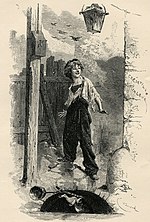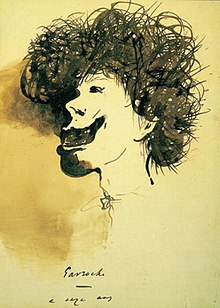Gavroche
- Gavroche is also a French beer, produced by Brasserie de Saint-Sylvestre; Le Gavroche is a French restaurant in Britain.
Gavroche (French pronunciation: [ɡavʁoʃ]) is a fictional character from the novel Les Misérables by Victor Hugo.

Gavroche in the novel

Gavroche is the eldest son of M. and Mme Thénardier. He has two sisters, Éponine and Azelma, and two unnamed younger brothers. He is also technically unnamed; the reader is told he chooses the name for himself, but is not provided with his real name. Mme. Thénardier only loves her daughters, and M. Thénardier shows no affection for any of his children. Gavroche is told by his parents to live in the street, because he would have a better life there.
The Thénardiers sell (or rent) their two youngest sons to a woman named Magnon. Due to a freak accident, the two boys are separated from Magnon without identification, and encounter Gavroche purely by chance. They are unaware of their identities, but Gavroche invites them to live with him and takes care of them. They reside in the hollow cavity of a giant elephant statue, the Elephant of the Bastille conceived by Napoleon as a fountain, but abandoned unfinished. This was no imaginary construction; located at the Place de la Bastille, it had been designed by Jean-Antoine Alavoine. The two boys soon leave him the next morning. They are last seen at the Luxembourg Gardens retrieving and eating discarded bread from a fountain. It is unknown what has happened to the two after that.
At dawn, Gavroche helps his father, Patron-Minette and Brujon escape from prison due to the request of Montparnasse.
During the student uprising of June 5–6, 1832, Gavroche joins the revolutionaries at the barricade.
After an exchange of gunfire with the National Guards, Gavroche overhears Enjolras remark that they are running out of cartridges. He decides he can help. He goes through an opening in the barricade and collects the cartridges from the dead bodies of the National Guard. In the process of collecting the cartridges and singing a song, he is shot and killed.
Argot
Argot is the slang used by thieves, criminals, and others who live in the streets. Victor Hugo was one of the first to note the slang and write it down. The character of Gavroche is used to introduce the concept of argot to the reader.[1] The word "argot" has actually come to be the current French and Spanish term for "slang".
Gavroche in the musical
Historical note: "Gavroche came to mind"
French songwriter Alain Boublil had the idea to adapt Victor Hugo's novel into a musical while at a performance of the musical Oliver! in London:
As soon as the Artful Dodger came onstage, Gavroche came to mind. It was like a blow to the solar plexus. I started seeing all the characters of Victor Hugo's Les Misérables—Valjean, Javert, Gavroche, Cosette, Marius, and Éponine—in my mind's eye, laughing, crying, and singing onstage.[2]
He pitched the idea to French composer Claude-Michel Schönberg, and the two developed a rough synopsis. They worked up an analysis of each character's mental and emotional state, as well as that of an audience. Schönberg then began to write the music, while Alain Boublil began work on the text.
Differences in the musical
There are a few notable plot differences in the Cameron Mackintosh stage musical.
- The playbill for the musical indicates that Gavroche's parents are the Thénardiers, but this is not indicated in the context of the musical itself. Also, Gavroche himself refers to the Thénardier family as if he were not a member of it.
- Gavroche's two younger brothers and his sister Azelma are cut completely.
- Marius gives a farewell letter to Éponine to deliver to Cosette. In the novel, it is Gavroche who delivers it.
- The musical changes the song that Gavroche sings at the barricade. (The version on the French concept album, however, is the same as in the book.) The song was restored in the Broadway revival and is titled "Ten Little Bullets".
Songs
Gavroche sings in the following songs in the musical:
- "Look Down"
- "Stars" (at the end of the song)
- "The ABC Café / Red and Black"
- "One Day More"
- "Javert at the barricade/Little People"
- "The Second Attack (Death of Gavroche)"/Ten Little Bullets
- "Finale/Do You Hear The People Sing? (Reprise)"
Adaptations
Musical
- Fabrice Bernard, 1980 original French concept album
- Florence Davis, Cyrille Dupont, Fabrice Ploquin, 1980 original French musical
- Ian Tucker, Oliver Spencer, Liza Hayden, original London cast
- Braden Danner, original Broadway cast
- RD Robb (understudy), original Broadway cast
- Rider Strong, San Francisco 1988
- J. D. Daniels, Broadway
- Chris Fountain
- Daniel Wright
- Blake Currie
- James Buckley
- Marc Marut and Illya Woloshyn, 1989 Toronto Production
- Sam Riegel, New York
- Taylor John, 1991 Broadway Replacement Cast
- Roon Staal, The Netherlands 1991
- Ludwig Briand, Cyrille Vannier, Alexis Tomassian, 1991 Paris Revival
- Adam Searles, (10th anniversary concert)
- Andrew Neale, 2001 Perth Production
- Jordan Dunne, 2001 West End Production
- Nick Jonas, 2003 Broadway Replacement Cast
- Mikkel Rosleff, 2003 - 2004 Danish Tour
- Stewart Johnson, 2007 Florida Production
- Austyn Myers, Jacob Levine and Brian D’Addario, 2006 Broadway Revival
- Brandon O'Rourke, 2008 Philadelphia Production
- Jimmy Menchl, 2008 Grosse Pointe South Production
- David Noël, Simon Dufresne, 2008 Québec City Production
- Sage Ryan, 2008 Hollywood Bowl Concert
- Joseph Serafini, 2009 Pittsburgh CLO
- Samuel Tye and Laurence Westrip, 2009 Perth Production
- Robert Madge, 25th Anniversary Concert
Film and television
- Anthony Phillips, 1917 adaptation
- Charles Badiole, 1925 adaptation
- Émile Genevois, 1934 adaptation
- Kolya Smorchkov, 1937 Adaptation
- Rinaldo Smordoni, 1948 adaptation
- Bobby Hyatt, 1952 adaptation
- Jimmy Urbain, 1958 adaptation
- Edoardo Nevola, 1964 adaptation
- Gilles Maidon, 1972 adaptation
- Carlos Arguelles, 1973 adaptation
- Dexter Fletcher, 1978 adaptation
- Emmanuel Curtil, 1982 adaptation
- Adam Searles, 1995 concert
- Shane Hervey, 1998 adaptation
- Jérôme Hardelay, 2000 adaptation
- Daniel Huttlestone, 2012 adaptation
Theater
- Das Freie Theaterwerk, Gavroche e.V., German Theatre Association (2008)
Cultural references
- In French, the word "Gavroche" has come to mean "street urchin" and "mischievous child."
- There is a homeless organization in Varna, Bulgaria named the Gavroche Association.[3]
- There are several restaurants across the world which use the name, including one in London run by the Roux brothers, Michel and Albert, which was the first in Britain to be awarded three Michelin stars.
- There is a French-language magazine about Thailand named Gavroche.[4]
- While it predates the novel by three decades, the boy brandishing the pistols in Eugène Delacroix's Liberty Leading the People is often associated with Gavroche. Gavroche fires a pistol in the novel; it is possible that Hugo meant to allude to the painting.
- Bulgarian poet Hristo Smirnenski has a poem called The Brothers of Gavroche.
- A famous Polish punk/ska group Alians named one of its albums 'Gavroche'.
- Nobby Nobbs takes the place of Gavroche in Terry Pratchett's Discworld novel Night Watch, which is loosely based on Les Misérables.
- In the French graphic novel series "Aspic, Détectives de l'Étrange", Gavroche appears as Hugo Beyle, and is said to have survived the barricades thanks to the mystical watch his father stole at Waterloo. He teams up with Auguste Dupin and Flora Vernet (herself a cousin of Sherlock Holmes) to fight Moriarty who is helped by the ghost of Javert.[5]
- In the American TV show Glee, a minor character owes his namesake to Gavroche.
Sources
- Les Misérables, Victor Hugo. (Marius, Book I; Saint Denis, Book VI; Jean Valjean, Book I)
References
- ^ "Mtholyoke.edu". Retrieved 2007-03-09.
- ^ Behr, Edward (1989). "The Complete Book of Les Misérables". Arcade Publishing (via Google Books). p. 50. Retrieved 25 May 2010.
- ^ "Gavroche-bg.org". Retrieved 2007-03-09. [dead link]
- ^ "gavroche-thailande.com". Retrieved 2009-03-11.
- ^ "Aspic, détectives de l'étrange" (in French).
External links
- Gavroche at the Internet Movie Database
- Search for Gavroche at the Internet Broadway Database
- Gavroche on-line at the on-line children clothing store
- Search for Theaterwerk Gavroche
- Search for Theaterwerk Gavroche at the German Web Presence 'Verband Berliner Amateur-Theater
